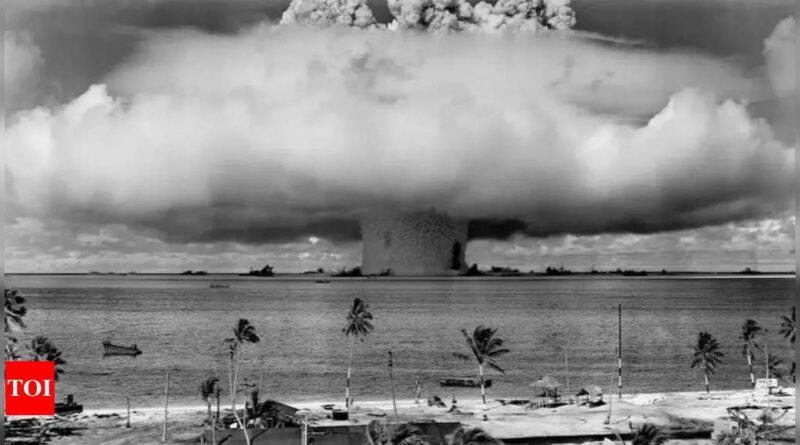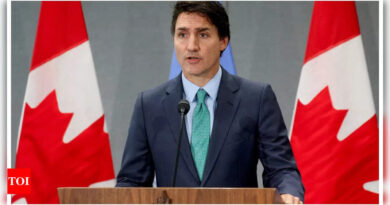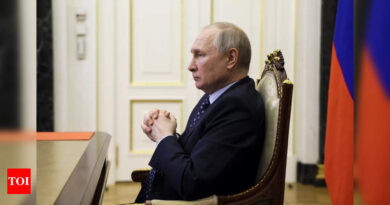Nuclear sharing trend gathering momentum, says FSA report – Times of India
MUMBAI: A report by the Federation of American Scientists (FAS) on Monday states that the trend of countries sharing nuclear weapons is gathering momentum, and will increase in the coming years.
Collectively, the world’s estimated 12,512 nuclear warheads belong to just nine countries. However, there are more than two dozen additional countries that participate in nuclear mission-related arrangements.
While these countries do not have direct launch authority over any nuclear warheads, they play an important role in their storage, planning, delivery, and safety and use-control, says the report by Hans M Kristensen, Matt Korda, Eliana Jones and Mackenzie Knight.
According to the report, nuclear sharing, not to be confused with burden sharing, generally refers to the practice of allowing non-nuclear countries to operate specially configured launchers to employ a nuclear-armed state’s nuclear weapons in times of war.
The US is modernising the infrastructure that supports its nuclear sharing mission in Europe, and is preparing to deploy its new B61-12 gravity bombs to European air bases for delivery by the US and allied aircraft, the authors claimed.
Russia says it is transferring nuclear-capable delivery systems to Belarus, training Belarusian military personnel on how to use them, and claiming to have deployed Russian nuclear weapons on Belarusian territory.
New NATO members Sweden and Finland are joining the alliance’s Nuclear Planning Group and will potentially decide to participate in NATO’s annual nuclear strike exercise. Countries like Poland and South Korea have advocated a role in the US nuclear mission as well.
In addition to the actual storage and maintenance of nuclear weapons, seven NATO member states — Belgium, Germany, Italy, the Netherlands, the United States, Turkey and Greece — contribute dual-capable aircraft (DCA) to NATO’s nuclear mission.
The report states that five NATO countries currently host a total of six bases that store US nuclear bombs in underground storage vaults. Several other bases have empty storage vaults in inactive status.
One of these (RAF Lakenheath in England) is being renovated to potentially store nuclear bombs in the future, if NATO decides to do so, according to the report.
Six additional NATO members — the Czech Republic, Denmark, Hungary, Poland and two unknown countries — play a supporting role in the grouping’s nuclear posture through what is known as the SNOWCAT (Support of Nuclear Operations With Conventional Air Tactics) mission, alongside the DCA-contributing countries.
The report says approximately 100 US nuclear weapons are currently estimated to be stored at six bases in five countries.
NATO itself has no ownership of nuclear weapons, and therefore no authority to launch them. This decision can only be made by the leaders of its nuclear-armed member states, and particularly by the United States, which retains ownership and authority over the B61 gravity bombs that are assigned to NATO DCA.
Regarding possible future nuclear sharing arrangements, the report says that these could include South Korea with Japan, Poland, Sweden and Finland, and Belgium and Germany.
Collectively, the world’s estimated 12,512 nuclear warheads belong to just nine countries. However, there are more than two dozen additional countries that participate in nuclear mission-related arrangements.
While these countries do not have direct launch authority over any nuclear warheads, they play an important role in their storage, planning, delivery, and safety and use-control, says the report by Hans M Kristensen, Matt Korda, Eliana Jones and Mackenzie Knight.
According to the report, nuclear sharing, not to be confused with burden sharing, generally refers to the practice of allowing non-nuclear countries to operate specially configured launchers to employ a nuclear-armed state’s nuclear weapons in times of war.
The US is modernising the infrastructure that supports its nuclear sharing mission in Europe, and is preparing to deploy its new B61-12 gravity bombs to European air bases for delivery by the US and allied aircraft, the authors claimed.
Russia says it is transferring nuclear-capable delivery systems to Belarus, training Belarusian military personnel on how to use them, and claiming to have deployed Russian nuclear weapons on Belarusian territory.
New NATO members Sweden and Finland are joining the alliance’s Nuclear Planning Group and will potentially decide to participate in NATO’s annual nuclear strike exercise. Countries like Poland and South Korea have advocated a role in the US nuclear mission as well.
In addition to the actual storage and maintenance of nuclear weapons, seven NATO member states — Belgium, Germany, Italy, the Netherlands, the United States, Turkey and Greece — contribute dual-capable aircraft (DCA) to NATO’s nuclear mission.
The report states that five NATO countries currently host a total of six bases that store US nuclear bombs in underground storage vaults. Several other bases have empty storage vaults in inactive status.
One of these (RAF Lakenheath in England) is being renovated to potentially store nuclear bombs in the future, if NATO decides to do so, according to the report.
Six additional NATO members — the Czech Republic, Denmark, Hungary, Poland and two unknown countries — play a supporting role in the grouping’s nuclear posture through what is known as the SNOWCAT (Support of Nuclear Operations With Conventional Air Tactics) mission, alongside the DCA-contributing countries.
The report says approximately 100 US nuclear weapons are currently estimated to be stored at six bases in five countries.
NATO itself has no ownership of nuclear weapons, and therefore no authority to launch them. This decision can only be made by the leaders of its nuclear-armed member states, and particularly by the United States, which retains ownership and authority over the B61 gravity bombs that are assigned to NATO DCA.
Regarding possible future nuclear sharing arrangements, the report says that these could include South Korea with Japan, Poland, Sweden and Finland, and Belgium and Germany.




